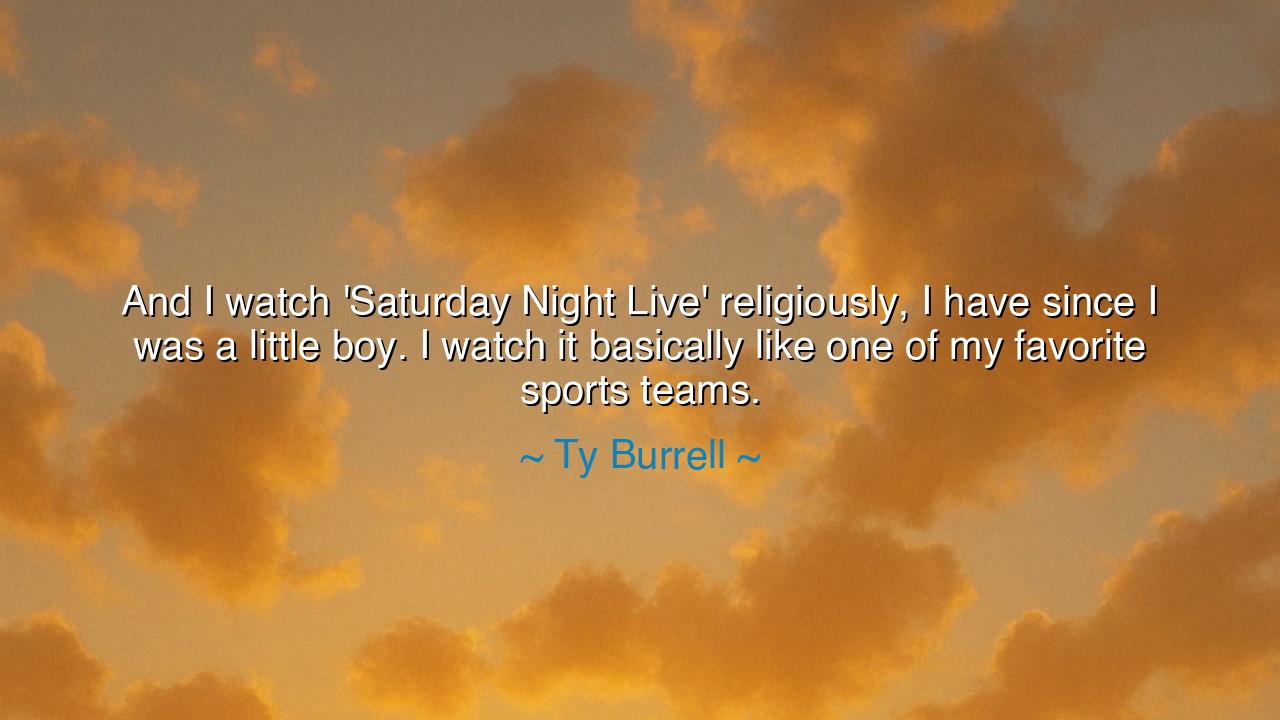
And I watch 'Saturday Night Live' religiously, I have since I
And I watch 'Saturday Night Live' religiously, I have since I was a little boy. I watch it basically like one of my favorite sports teams.






"And I watch 'Saturday Night Live' religiously, I have since I was a little boy. I watch it basically like one of my favorite sports teams." These words from Ty Burrell reveal a deep and enduring connection between the viewer and the world of entertainment. In his comparison of watching SNL to the devotion one might have for a sports team, Burrell touches upon something powerful and deeply human: our desire for community, our need for connection, and our longing to be a part of something greater than ourselves. Just as the athlete trains tirelessly for the next game, the viewer too invests in the performance, in the shared experience of witnessing creativity, humor, and cultural relevance unfold before their eyes.
In the ancient world, the bond between an audience and performers was also sacred. Consider the Greek amphitheaters, where tragedies and comedies were performed before thousands. The Athenians would gather to witness the great plays of Sophocles and Euripides, not merely for entertainment, but to engage in a communal experience that reflected the human condition. The audience would react together, laugh, weep, and reflect, for the performances were not just stories—they were ways of connecting to the universal truths of existence. Similarly, the devotion Burrell describes is not just a personal hobby, but a form of participation in something larger, something that speaks to the heart of the times.
The comparison to sports teams is also instructive. In the ancient world, just as in today’s age, people gathered not only for the spectacle of the game but for the sense of identity it brought. The Romans, for instance, would crowd into the Colosseum, not only to witness the gladiatorial contests, but to feel the rush of victory and the agony of defeat, to feel a part of something larger than themselves. The spirit of the team, the collective energy of the crowd, was what elevated the experience from mere competition to a shared ritual. Just as fans today are moved by the triumphs and failures of their favorite teams, the ancient crowds were similarly bound together by the power of shared passion.
Consider the example of Alexander the Great, who was not only a conqueror but also a performer in the grandest sense of the word. As he moved across the lands, his deeds became legendary, and the masses gathered to witness his military exploits. But just as Ty Burrell watches SNL religiously, many of his followers too were devoted to his every move, not merely because of his victories, but because of the connection they felt to his persona and what he represented—a vision of greatness, courage, and unity. Alexander, in his way, was a performer too, as his exploits became theater for the masses, giving them something to root for, something to believe in.
In the same way, Saturday Night Live, for Burrell and countless others, becomes a form of shared experience. The comedic sketches, the parody, and the music provide a mirror to society, reflecting both its absurdities and its truths. SNL does not merely entertain—it engages its audience in a ritual of laughter, reflection, and connection. Like the ancient audience that watched and responded in unison to the tragedies and comedies of the theater, the modern viewer of SNL shares in the cultural moment, often laughing not just at the jokes, but at the shared recognition of the world they are living in.
The lesson here is clear: Just as the great philosophers and thinkers of the past recognized the importance of community, shared rituals, and collective experiences, so too should we. We are not meant to live in isolation, but to engage with the world around us, to become part of a larger story. Whether through art, sports, or even comedy, these collective experiences form the backbone of human connection. Ty Burrell’s devotion to SNL reflects not just an entertainment preference, but a recognition of how such cultural events shape our understanding of the world and of ourselves.
In practical terms, we must recognize the value of our own communal experiences. Engage with the world around you, whether through art, sports, or the shared rituals of your own life. Find the moments of connection that resonate deeply with you and immerse yourself in them. Whether it is watching a favorite show, attending a live performance, or cheering for your local team, these experiences are not mere distractions—they are ways in which we become part of something greater than ourselves. By embracing and celebrating these moments of shared humanity, we build the bonds that connect us all, just as the ancient Greeks did in their theaters and the Romans did in their arenas.






AAdministratorAdministrator
Welcome, honored guests. Please leave a comment, we will respond soon